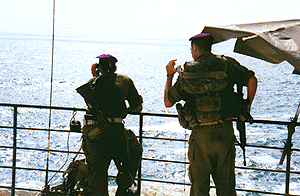| Week Ending | Topic and Readings |
| August 26 | Introduction to the Class
The Psychology of Peacekeeping
Readings:
- Chapter 1: The evolving psychology of peacekeeping (PoP)
- Chapter 1: Negotiation in the context of international conflict (CWIC)
|
| September 2 & 9 | Prevention: To Avert Conflict or War
Readings:
- Chapter 2: Peace through economic and social development (PoP)
- Chapter 3: Early intervention: Prediction and action (PoP)
- Chapter 4: The psychology of diplomacy (PoP)
- Chapter 5: Cultural and ethnic issues of conflict and peacekeeping (PoP)
- Psychosocial roots of genocide: Risk, prevention, and intervention, by L. Woolf & M. Hulsizer (2005) in Journal of Genocide Research, 7, 101-128.
|
| September 16 | Thinking Like an Activist
Work in groups on projects and discuss with class
Readings: - Chapter 2: Thinking like an activist (CWIC)
- Causes and implications of ethnic conflict, by M. Brown in The Ethnicity Reader,
edited by M. Guibernau & J. Rex
|
| September 23 | Early Intervention
Understanding the Problem
Readings: - Chapters 6: Insensitivity to the value of human life: A study of psychophysical
numbing (PoP)
- Chapter 3 : Case study-- The Middle East (CWIC)
- Psychological dynamics of intractable ethnonational conflicts: The
Israeli-Palestinian case by N. N. Rouhana & D. Bar-Tal (1998) in
American Psychologist, 53, 761-770.
|
| September 30 & October 7 | Understanding the Problem (continued)
Readings: - Chapter 4: Understanding partisan perceptions (CWIC)
- Chapter 5: The decision for the other side's point of view (CWIC)
- Chapter 6: The view from the bureaucracy (CWIC)
- Chapter 11: Peacekeeping and the psychology of conflict resolution (PoP)
Exam I (September 30)
|
| October 14 & 28 | Understanding the Task
Readings:
- Chapter 7: Personnel selection, preparation and training for UN peacekeeping missions (PoP)
- Chapter 8: Psychological aspects of peacekeeping on the ground (PoP)
- Chapter 9: Psychological ambiguities in peacekeeping (PoP)
|
| November 4 | Understanding the Task (continued)
Readings: - Chapter 7: Case study on arms control (CWIC)
- Chapter 8: Understanding the human dimension (CWIC)
- Chapter 9: Building a productive framework for negotiation (CWIC)
|
| November 11 | Idea Generation
Work on projects and discuss with class
Readings:
- Solving the inventing problem (CWIC)
- Chapter 11: Defining our purpose and strategy (CWIC)
- Chapter 16: Selecting a point of choice (CWIC)
Exam II
|
| November 18 | Putting Ideas to Work
Readings: - Chapter 12: Case study - The bombing campaign of Vietnam (CWIC)
- Chapter 13: Analyzing threats and sanctions (CWIC)
- Chapter 14: Changing the demand (CWIC)
|
| November 25 | From Violence to a Durable Peace
Readings:
- Chapter 10: Humanitarian intervention, psychosocial assistance, and peacekeeping (PoP)
- Chapter 12: Creating a durable peace: Psychological aspects of rebuilding and reforming the indigenous criminal justice system (PoP)
- Diplomacy, Negotiation, and peaceful settlement, by D. Barash in Teaching
About International Conflict and Peace, edited by M Merryfield & R.
Remy
|
| December 2 | From Violence to a Durable Peace (continued)
Readings:
- Chapter 13: The psychological consequences of mines left behind following a conflict (PoP)
- Chapter 14: Postconflict peacebuilding and making efforts count: Reconstruction,
elections, and beyond (PoP)
- Chapter 17: Finding a "yesable" proposition (CWIC)
|
| December 9 | From Violence to a Durable Peace (continued)
Readings:
- Chapter 15: Forgiveness, reconciliation, and the contribution of international peacekeeping (PoP)
- Chapter 16: The peace process at its culmination: The reconciliation elections (PoP)
- Chapter 17: Treating the new world disorder (PoP)
- Breaking the cycle of genocidal violence: Healing and reconciliation, by
E. Staub in Perspectives on loss: A sourcebook, edited by J. H. Harvey
|
|
December 14 | Final Projects
Final Exam
|
